Business
Plan to delay federal budget makes it harder for Canadians to track spending and debt
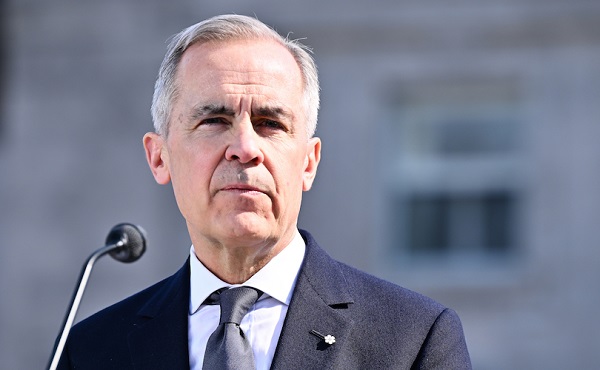
From the Fraser Institute
By Jake Fuss and Grady Munro
Although Parliament is set to return next week for the first time in more than five months, Canadians are being asked for even more patience when it comes to a federal budget.
Last week, after conflicting messages from his finance minister, Prime Minister Mark Carney said his government will table a budget in the fall. While this is better than the government’s original plan to punt the budget into 2026, it’s still a long time to wait. Past federal governments have been able to quickly turn around a budget following an election. There’s no simply no reason why the government can’t deliver a budget within the next few months. Clearly, fiscal transparency and accountability are not high priorities for the Carney government.
While the federal government is not legislatively required to release a budget in the spring—spending is functionally approved in Parliament through periodic votes (the next vote is scheduled for June)—the budget provides a comprehensive and accessible outline of federal spending, taxing and borrowing plans now and for the coming years. In other words, an annual budget is a critically important financial and democratic document that informs Canadians on their government’s fiscal plan.
Budgets also help the public hold the government accountable to its campaign commitments. Without a budget, it’s virtually impossible for Canadians to know whether or not the government is actually staying true to its promises. For instance, the Carney government could run bigger deficits and accumulate more debt than promised, but Canadians would have little way of knowing. This only adds to the uncertainty around the government’s plan for certain key areas of policy—contradicting Prime Minister Carney’s promise of an “action-oriented” government that moves quickly.
The budget also allows parliamentarians to understand how the estimates and policies they vote on will impact the state of federal finances. For instance, the Carney government plans to cut income taxes, which will have a big impact on government finances. But without a timely budget, parliamentarians may not have the necessary information to make informed decisions on behalf of their constituents. Incidentally, the Trudeau government delayed the release of important fiscal documents to push off bad news until it garners less attention from the media and the public, and there’s reason to believe the Carney government is doing the same thing now.
The Liberal election platform—which currently provides the only indication of the new government’s fiscal plan—promises higher spending, larger deficits and more debt than the Trudeau government had planned in its last fiscal update. This flies in the face of Prime Minister Carney’s promise of a “very different approach” to fiscal policy. The Carney government also plans to split federal spending into two separate budgets: an operating budget and capital budget. This will further reduce government transparency by making it more difficult to identify the actual size of the deficit, while also giving the government leeway to get creative with its accounting.
Prime Minister Carney promised a new responsible approach to government finances. However, he’s off to a poor start on delivering this promise.
Business
Trans Mountain executive says it’s time to fix the system, expand access, and think like a nation builder

Mike Davies calls for ambition and reform to build a stronger Canada
A shift in ambition
A year after the Trans Mountain Expansion Project came into service, Mike Davies, Senior Director of Marine Development at Trans Mountain, told the B.C. Business Summit 2025 that the project’s success should mark the beginning of a new national mindset — one defined by ambition, reform, and nation building.
“It took fifteen years to get this version of the project built,” Davies said. “During that time, Canadian producers lost about $50 billion in value because they were selling into a discounted market. We have some of the world’s largest reserves of oil and gas, but we can only trade with one other country. That’s unusual.”
With the expansion now in operation, that imbalance is shifting. “The differential on Canadian oil has narrowed by about $13 billion,” he said. “That’s value that used to be extracted by the United States and now stays in Canada — supporting healthcare, reconciliation, and energy transformation. About $5 billion of that is in royalties and taxes. It’s meaningful for us as a society.”
Davies rejected the notion that Trans Mountain was a public subsidy. “The federal government lent its balance sheet so that nation-building infrastructure could get built,” he said. “In our first full year of operation, we’ll return more than $1.3 billion to the federal government, rising toward $2 billion annually as cleanup work wraps up.”
At the Westridge Marine Terminal, shipments have increased from one tanker a week to nearly one a day, with more than half heading to Asia. “California remains an important market,” Davies said, “but diversification is finally happening — and it’s vital to our long-term prosperity.”
Fixing the system to move forward
Davies said this moment of success should prompt a broader rethinking of how Canada approaches resource development. “We’re positioned to take advantage of this moment,” he said. “Public attitudes are shifting. Canadians increasingly recognize that our natural resource advantages are a strength, not a liability. The question now is whether governments can seize it — and whether we’ll see that reflected in policy.”
He argued that governments have come to view regulation as a “free good,” without acknowledging its economic consequences. “Over the past decade, we’ve seen policy focus almost exclusively on environmental and reconciliation objectives,” he said. “Those are vital, but the public interest extends well beyond that — to include security, economic welfare, the rule of law, transparency, and democratic participation.”
Davies said good policy should not need to be bypassed to get projects built. “I applaud the creation of a Major Projects Office, but it’s a disgrace that we have to end run the system,” he said. “We need to fix it.”
He called for “deep, long-term reform” to restore scalability and investment confidence. “Linear infrastructure like pipelines requires billions in at-risk capital before a single certificate is issued,” he said. “Canada has a process for everything — we’re a responsible country — but it doesn’t scale for nation-building projects.”
Regulatory reform, he added, must go hand in hand with advancing economic reconciliation. “The challenge of our generation is shifting Indigenous communities from dependence to participation,” he said. “That means real ownership, partnership, and revenue opportunities.”
Davies urged renewed cooperation between Alberta and British Columbia, calling for “interprovincial harmony” on West Coast access. “I’d like to see Alberta see B.C. as part of its constituency,” he said. “And I’d like to see B.C. recognize the need for access.”
He summarized the path forward in plain terms: “We need to stem the exit of capital, create an environment that attracts investment, simplify approvals to one major process, and move decisions from the courts to clear legislation. If we do that, we can finally move from being a market hostage to being a competitor — and a nation builder.”
Business
Canada is still paying the price for Trudeau’s fiscal delusions
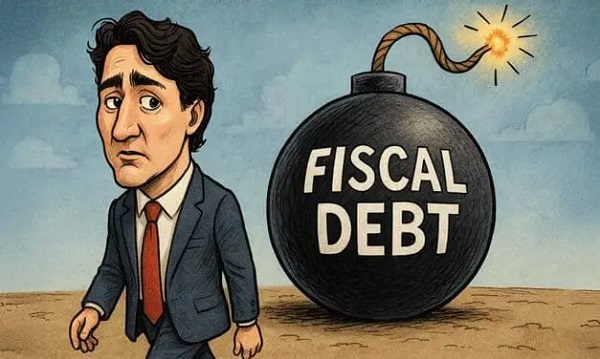
This article supplied by Troy Media.
 By Lee Harding
By Lee Harding
Trudeau’s reckless spending has left Canadians with record debt, poorer services and no path back to a balanced budget
Justin Trudeau may be gone, but the economic consequences of his fiscal approach—chronic deficits, rising debt costs and stagnating growth—are still weighing heavily on Canada
Before becoming prime minister, Justin Trudeau famously said, “The budget will balance itself.” He argued that if expenditures stayed the same, economic growth would drive higher tax revenues and eventually outpace spending. Voila–balance!
But while the theory may have been sound, Trudeau had no real intention of pursuing a balanced budget. In 2015, he campaigned on intentionally overspending and borrowing heavily to build infrastructure, arguing that low interest rates made
it the right time to run deficits.
This argument, weak in its concept, proved even more flawed in practice. Postpandemic deficits have been horrendous, far exceeding the modest overspending initially promised. The budgetary deficit was $327.7 billion in 2020–21, $90.3 billion the year following, and between $35.3 billion and $61.9 billion in the years since.
Those formerly historically low interest rates are also gone now, partly because the federal government has spent so much. The original excuse for deficits has vanished, but the red ink and Canada’s infrastructure deficit remain.
For two decades, interest payments on federal debt steadily declined, falling from 24.6 per cent of government revenues in 1999–2000 to just 5.9 per cent in 2021–22—thanks largely to falling interest rates and prior fiscal restraint. But that trend has reversed. By 2023–24, payments surged past 10 per cent for the first time in over a decade, as rising interest rates collided with record federal debt built up under Trudeau.
Rising debt costs are only part of the story. Federal revenues aren’t what they could have been because Canada’s economy has stagnated. High immigration, which drives productivity down, is the only thing masking our lacklustre GDP growth. Altogether, Canada was 35th among 38 countries in the Organization for Economic Co-operation and Development (OECD) for per capita GDP growth from 2014 to 2022 at just 0.2 per cent. By comparison, Ireland led at 45.2 per cent, followed by the U.S. at 20.8 per cent.
Why should a country like Canada, so blessed with natural resources and knowhow, do so poorly? Capital investment has fled because our government has made onerous regulations, especially hindering our energy industry. In theory, there’s now a remedy. Thanks to new legislation, the Carney government can extend its magic sceptre to those who align with its agenda to fast-track major projects and bypass the labyrinth it created. But unless you’re onside, the red tape still strangles you.
But as the private sector withers under red tape, Ottawa’s civil service keeps ballooning. Some trimming has begun, rattling public sector unions. Still, Canada will be left with at least five times as many federal tax employees per capita as the U.S.
Canada also needs to ease its hell-bent pursuit of net-zero carbon emissions. Hydrocarbons still power the Canadian economy—from vehicles to home heating—and aren’t practically replaceable. Canada has already proven that chasing net zero leads to near-zero per capita growth. Despite high immigration, the OECD projects Canada to have the lowest overall GDP growth between 2021 and 2060.
The Nov. 4 release of the federal budget is better late than never. So would be a plan to grow the economy, slash red tape and eliminate the deficit. But we’re unlikely to get one.
Trudeau may be gone, but his legacy of fiscal recklessness is alive and well.
Lee Harding is a research fellow with the Frontier Centre for Public Policy.
Troy Media empowers Canadian community news outlets by providing independent, insightful analysis and commentary. Our mission is to support local media in helping Canadians stay informed and engaged by delivering reliable content that strengthens community connections and deepens understanding across the country
-
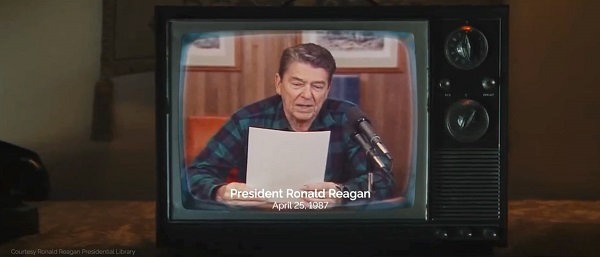
 Business2 days ago
Business2 days ago‘TERMINATED’: Trump Ends Trade Talks With Canada Over Premier Ford’s Ronald Reagan Ad Against Tariffs
-
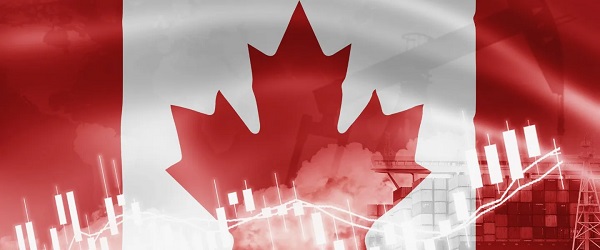
 Business24 hours ago
Business24 hours agoCarney government risks fiscal crisis of its own making
-

 Alberta24 hours ago
Alberta24 hours agoB.C. would benefit from new pipeline but bad policy stands in the way
-

 Frontier Centre for Public Policy1 day ago
Frontier Centre for Public Policy1 day agoChurches Are All That Stands Between Canada And Tyranny
-
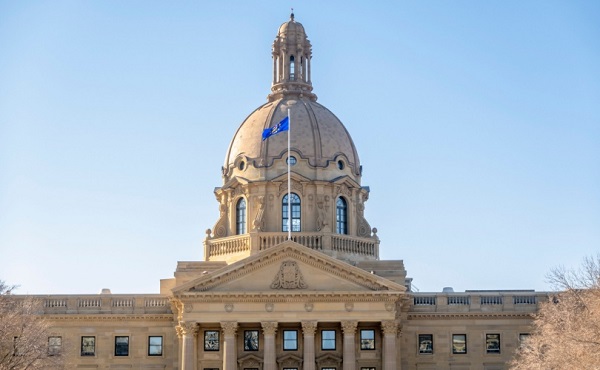
 Alberta1 day ago
Alberta1 day agoAlberta introduces bill allowing province to reject international agreements
-

 Energy2 days ago
Energy2 days agoB.C. premier’s pipeline protestations based in fallacy not fact
-

 Business7 hours ago
Business7 hours agoTrans Mountain executive says it’s time to fix the system, expand access, and think like a nation builder
-

 Business1 day ago
Business1 day agoTrump Admin Establishing Council To Make Buildings Beautiful Again





